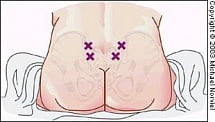Pain relief
When you desire a stronger form of pain relief, you can receive medicinal pain relief.
Nitrous oxide
The first option is nitrous oxide (laughing gas). With your own midwife, you can receive nitrous oxide at Beval Centrum West or Amstelland Hospital from 6 centimeters dilation. It reduces the peak of pain, allowing you to relax well in between. Its use has no adverse effects on your child or the birthing process.
For the other pain relief options, we transfer your care to the hospital during labor. This is because they can affect the condition of your child or yourself, requiring additional monitoring.
Remifentanil
Remifentanil is administered via an infusion pump, allowing you to self-administer the morphine-like substance. Its effect is similar to nitrous oxide. As a mother, you may become so relaxed that in very rare cases, you could experience a brief cessation of breathing, hence monitoring of your blood pressure and oxygen levels is necessary.
Epidural anesthesia
An epidural aims to eliminate pain. However, its drawbacks include potential weakening of contractions, low blood pressure requiring additional interventions such as oxytocin to stimulate contractions, vacuum extraction, or cesarean section. Additionally, about 10% of women with an epidural may develop fever, necessitating antibiotics via intravenous infusion for the mother and the baby receiving antibiotics via intravenous infusion for the first 48 hours after birth.
"In the Netherlands, YOU have the choice. Midwives and doctors are not against pain relief, as long as it is a well-considered decision. It's best to decide during labor because you don't know what a contraction feels like until you experience one. So how can you know if you will need pain relief or not?"















